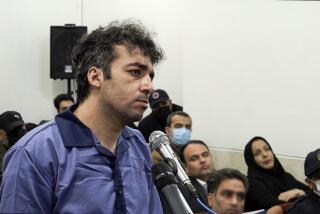Chinese Execute 14 for Decade of Crime
- Share via
BEIJING — Chinese authorities executed 14 members of a notorious gang Sunday, ending the career of one of this country’s most violent criminal groups in more than 50 years of Communist rule, state media reported.
Gang leader Zhang Jun and his accomplices were sentenced to death for a nearly decade-long string of murders and robberies that left 28 people dead and 22 wounded.
Their executions were among 29 reportedly carried out Sunday, the latest in a national “strike hard” campaign against crime. State media said the crackdown has led to 500 executions since it began last month.
Zhang and 10 accomplices were arrested in September after he and three fellow gang members killed seven people in Hunan province while attempting a bank robbery.
Under interrogation, Zhang confessed to a string of killings and robberies stretching back to June 1991.
With China trying to strengthen its rule of law, the government has given the media unprecedented latitude in reporting legal news. Lurid crime stories have become a staple of the tabloids. The reports have stoked the public’s indignation at rampant crime, prompting more “strike hard” campaigns, which, in turn, generate more publicity.
But in a country where propaganda invariably portrays justice triumphant over evil, reports of the unrepentant Zhang’s coldblooded exploits seem to have contributed to a Chinese version of “gangster chic.”
State media ran gory pictures of Zhang’s victims as well as lengthy interviews conducted with him in prison. At a nationally televised trial reportedly watched by tens of millions of Chinese, a nattily dressed Zhang refused legal counsel, saying he deserved to die.
“I have never been afraid of death,” he told reporters.
When interrogators asked what his profession was, Zhang answered “professional bandit,” according to an expose in Life Week magazine.
Possession of firearms is illegal in China, but Zhang had stolen a sizable arsenal and was arrested carrying a pistol, 180 bullets and an antitank grenade, according to press accounts.
Other reports focused on how he manipulated his lovers, one of whom admitted to killing at his command. Four of Zhang’s former mistresses were executed as accomplices, while another received a nine-year jail term.
Yet to officials’ dismay, the media hype “caused some young people to idolize Zhang,” according to the official New China News Agency.
In the southwestern city of Chongqing, where Zhang was arrested, one young man told a New China News Agency reporter, “Zhang Jun was honest, he valued loyalty and acted courageously.”
A young girl agreed: “He’s kind of like the gangsters in the movies, really likable.”
In an article in the official Beijing Youth Daily, Beijing-based lawyer Zhang Yansheng noted that Zhang Jun received his first punishment--a three-year “reform through labor” sentence for brawling--in 1983, the year of the initial “strike hard” campaign. Another campaign followed in 1996.
“Faced with the ‘strike hard campaigns,’ not only did Zhang Jun not control himself, but in the end he created one of the worst violent criminal gang cases since the [1949] founding of the new China,” the lawyer wrote.
Chinese citizens are angry after two decades of rising crime rates, and they generally welcome stricter law enforcement. But experts warn that the get-tough campaigns, in which politicians order courts to mete out swifter and harsher punishments than usual, risk causing abuses.
In a recent article in the popular Southern Weekend newspaper, Justice Ministry researcher Liu Junwu wrote that the campaigns must avoid China’s centuries-old emphasis on catching criminals while overlooking procedural injustice, a situation that has led to “cases of extracting confessions by torture, and detention past legal time limits.”
Foreign human rights critics are alarmed that the campaigns appear to have been extended to target suspected political offenders.
More to Read
Sign up for Essential California
The most important California stories and recommendations in your inbox every morning.
You may occasionally receive promotional content from the Los Angeles Times.












